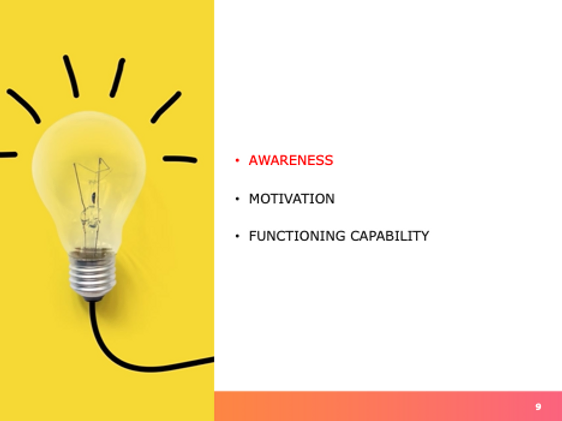
There are 3 steps in any self-development or change, and they have to proceed in this order.
I learned this lesson when I was working on my Ph. D. in PsychoEducational Processes. This field is a combination of group psychology and adult learning. The practical application of this field in a corporate setting is change management. And this is what I was doing at the time I was working on my doctorate. I was working on the “human” change that needed to accompany “technology” changes.
My boss at the time told me that this program (and I by extension) was radically complicating the process that is needed.
“Sarah,” he said. “There are only 3 steps you need to pay attention to and they have to proceed in this order: Awareness, Motivation, and then Functioning Capability.”
For anyone to change his or her direction, goals, behavior, thoughts, feelings…anything, first (s)he(they) has to be aware of where (s)he is now, what is happening now, and what his/her/their current behavior, thoughts and emotions are. Based on that awareness, the person will be motivated to change ONLY IF there is a desired outcome at the other end. Then, and only then, will the tools for making a change be of any use.
So it all starts with awareness, but awareness of what?
In the case of a specific behavior, the awareness comes in the form of what an individual is currently doing and what the outcome is. It is amazing how much of our current behavior is not in our current awareness. Let’s take the case of an executive whose direct reports are experiencing a lot of hurt as a result of his constant criticism and lack of praise. It is amazing how often this behavior is not in the present-day awareness of the executive. And the first step in dealing with these situations is always to help him/her become aware of the specific behavior and the outcome it is having on others. This is one of the reasons that feedback is so critical. And it can come in many ways, not only from an intervention.
We cannot change that which we don’t know. So the executive interested in continually improving is always asking the team how they experience their relationship. An easy way to do this is to ask the questions:
How do you experience our relationship on a scale of 1-10?
What would make it a 10?
You don’t have to take action on all feedback, but it is always helpful in increasing awareness.
But there is another aspect of awareness that I am becoming increasingly interested in, and that is how individuals become aware of their inner voices: their own interests, strengths, and needs.
I have been talking lately with several very successful executives and listening to them reflect upon their careers. And, without exception, each of them has told me what they have learned about themselves—their own strengths, interests, and needs—by reflecting on their experiences and listening to their voices.
Perhaps it was a job that was not at all fulfilling—they learned what interested them more.
Perhaps it was a job that was particularly easy and fun-they came to understand what their strengths were.
Perhaps it was a time when they burned out—they learned what their needs were.
The point is that they were constantly on the path to learning about themselves. And every job was an opportunity to do so.
Successful executives are always looking for ways to increase their awareness about themselves, whether it is feedback about their behavior or their own inner voice.